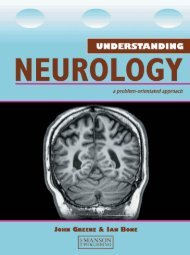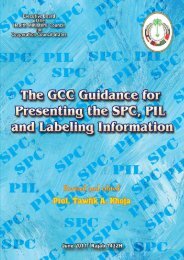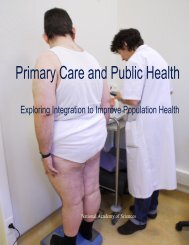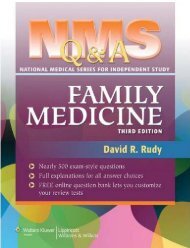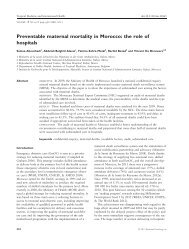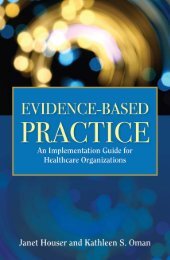Preventing Childhood Obesity - Evidence Policy and Practice.pdf
Preventing Childhood Obesity - Evidence Policy and Practice.pdf
Preventing Childhood Obesity - Evidence Policy and Practice.pdf
Create successful ePaper yourself
Turn your PDF publications into a flip-book with our unique Google optimized e-Paper software.
Evaluation of community-based obesity interventions<br />
tations in terms of research rigor, produce very little<br />
useful evidence to inform policy <strong>and</strong> practice change.<br />
They should either be more limited in scope, focusing<br />
on specific research questions, or there needs to be a<br />
mechanism to bring in other research funding. 34 A<br />
final option may be to redistribute these agencies ’<br />
funding so that a proportion of funded projects are<br />
comprehensively evaluated, with the remainder freed<br />
from the distractions of a superficial evaluation exercise.<br />
This means that such research requires strong<br />
col laboration between academics <strong>and</strong> research funders<br />
on the one h<strong>and</strong>, <strong>and</strong> government agencies on the<br />
other.<br />
Wales has experienced success in working with government<br />
to identify innovative policies, which have<br />
been initially implemented in an experimental fashion,<br />
allowing r<strong>and</strong>omized trials to be conducted, nested<br />
within the national roll - out of both the free school<br />
breakfast initiative, 26 <strong>and</strong> the national exercise referral<br />
scheme. However, these examples remain rare, with<br />
governments generally remaining unwilling to expose<br />
novel policies to the glare of a rigorous independent<br />
controlled evaluation, 39 despite the need to take<br />
advantage of these opportunities to generate evidence<br />
of effectiveness. 40 Alternatively, policy decisions are<br />
made in parallel with the conduct of evaluations<br />
rather than being informed by the outcome of the<br />
evaluations. 39<br />
Conclusion<br />
Community-based obesity prevention interventions<br />
will typically include some variability in application to<br />
accommodate different settings <strong>and</strong> populations. This<br />
presents challenges for evaluators. However, rigorous<br />
evaluation can be achieved through staged development<br />
<strong>and</strong> evaluation of the intervention program.<br />
This may progressively involve theoretical development,<br />
qualitative testing, modeling, feasibility testing<br />
<strong>and</strong> an exploratory trial. It will then be possible to<br />
conduct a large - scale intervention <strong>and</strong> summative<br />
evaluation. At this point, a r<strong>and</strong>omized or cluster r<strong>and</strong>omized<br />
trial is both possible <strong>and</strong> desirable to achieve<br />
an unbiased estimate of the average effect of the intervention.<br />
It is also critical to include comprehensive<br />
qualitative investigations to identify <strong>and</strong> underst<strong>and</strong><br />
the factors that influence the effectiveness of the<br />
intervention. A well developed <strong>and</strong> comprehensive<br />
approach such as this requires substantial funding<br />
as well as collaboration <strong>and</strong> commitment between<br />
researchers, funding bodies <strong>and</strong> government<br />
agencies.<br />
Acknowledgements<br />
Lisa Gibbs acknowledges the NHMRC Capacity<br />
Building Grant for Child <strong>and</strong> Adolescent <strong>Obesity</strong><br />
Prevention <strong>and</strong> the Jack Brockhoff Child Health <strong>and</strong><br />
Wellbeing Program for salary <strong>and</strong> operational funding<br />
support. The authors also acknowledge the helpful<br />
feedback provided by Andrea Sanigorski following a<br />
review of a draft of the chapter.<br />
References<br />
1 Macintyre S , Petticrew M : Good intentions <strong>and</strong> received<br />
wisdom are not enough . J Epidemiol Community Health<br />
2000 ; 54 : 802 – 803 .<br />
2 Shaw I : Qualitative Evaluation . London : Sage , 1999 .<br />
3 Pawson RD , Tilley N : Realistic Evaluation . London : Sage ,<br />
1997 .<br />
4 Tilley N . Realistic Evaluation: An Overview . 2000 , from<br />
www.danskevalueringsselskab.dk/<strong>pdf</strong>/Nick%20Tilley.<strong>pdf</strong><br />
(accessed 5 February 2007).<br />
5 Boruch RF , McSweeney AJ , Soderstrom EJ : R<strong>and</strong>omized<br />
field experiments for program planning, development, <strong>and</strong><br />
evaluation: an illustrative bibliography . Eval Q 1978 ; 2 :<br />
655 – 695 .<br />
6 Johnson RB , Onwuegbuzie AJ : Mixed methods research: a<br />
research paradigm whose time has come . Educ Res 2004 ;<br />
33 : 14 – 26 .<br />
7 Baum F : Researching public health: behind the qualitative -<br />
quantitative methodological debate . Soc Sci Med 1995 ; 40 :<br />
459 – 468 .<br />
8 Abrams D : Applying transdisciplinary research strategies to<br />
underst<strong>and</strong>ing <strong>and</strong> eliminating health disparities . Health<br />
Educ Behav , 2006 ; 33 : 515 – 531 .<br />
9 Hawe P , Shiell A , Riley T : Complex interventions: how “out<br />
of control ” can a r<strong>and</strong>omised controlled trial be? Bri Med J<br />
2004 ; 328 : 1561 – 1563 .<br />
10 Weiss CH , ed.: Theory-based evaluation: past, present, <strong>and</strong><br />
future. Progress <strong>and</strong> future directions in evaluation: perspectives<br />
in theory, practice <strong>and</strong> methods . In: Rog DJ , Fournier<br />
D , eds. New Directions for Evaluation . San Francisco :<br />
Jossey - Bass , 1997 : 41 – 55 .<br />
11 Baron RM , Kenny DA : The moderator-mediator variable<br />
distinction in social psychological research: conceptual,<br />
strategic <strong>and</strong> statistical considerations . J Pers Soc Psychol<br />
1986 ; 51 : 1173 – 1182 .<br />
12 Gabriel RM : Methodological challenges in evaluating community<br />
partnerships <strong>and</strong> coalitions: Still crazy after all these<br />
years . J Community Psychol 2000 ; 28 : 339 – 352 .<br />
165



